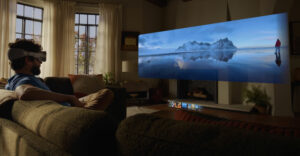Lytro last week announced its Immerge concept, a virtual reality camera system that promises to plop people right in the center of an experience the company calls “six degrees of freedom.”
Lytro’s Immerge harnesses the potential of light field technology, the same tech behind the clandestineMagic Leap augmented reality headset.
Light field enables Immerge to capture data from all points, and viewpoints, inside any given volume of space, the company said. That volumentric data gives Immerge six degrees of freedom to explore cinematic VR experiences.
The system is set to launch next year.
Professional Grade
The Immerge system includes the configurable light field camera array, a server for storage and processing, a VR video editor and a playback engine.
That combination allows for stichtless videos, multiple perspectives, precise parallaxes and depth data embedded in every frame, the company said.
Captured content is optimized for playback on a variety of high-end headsets, and mobile platforms are supported, according to Lytro.
That’s important, considering that many VR production houses have been developing both VR equipment and software, said Ariel Braunstein, Lytro’s chief product officer.
“By engaging with leading VR production houses early in the system’s development, we hope to ensure that Lytro Immerge will meet the needs of these innovative studios and allow them to focus on what they wish to spend their resources on content development,” he told TechNewsWorld.
As exciting as it all may sound, Immerge still is only a concept, said Kevin Krewell, principal analyst for Tirias Research.
“They haven’t even shown a prototype yet — everything is a render,” he told TechNewsWorld. “So we have to wait to see a final product to get a real sense of how effective it is.”
VR Bound
While the digital gaming world has been poised to give VR its initial push into the mainstream, its the cinematic experiences that could give the field its staying power.
Lots of people think it’s going to be a big market starting next year and ramping up in 2017, said Krewell.
“Lytro is obviously doing a bit of a pivot in trying to jump on the VR bandwagon to create a new market for itself,” he said. “But this is a long-term play. It’s not short-term big win for anyone.”
It will take a few years to prove that there’s a real, sustainable market for VR, he said. It’s hard to forget the failures of 3-D TV and Nintendo’s dizzying Virtual Boy.
The Virtual Boy was a long time ago, and 3-D TV’s era is staring to become history. Only time will tell if VR is the latest bust in a line of tech attempting to leave traditional TV.
“Right now, it’s wise to be a little cautious,” Krewell said. “But at the same time, if VR can fulfill its promise, it could be a real game changer.”




















































